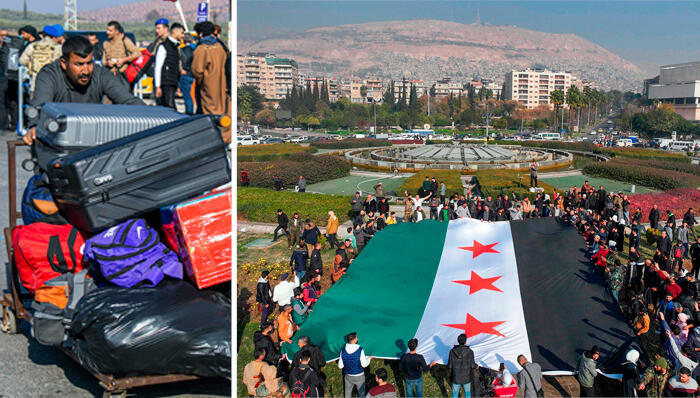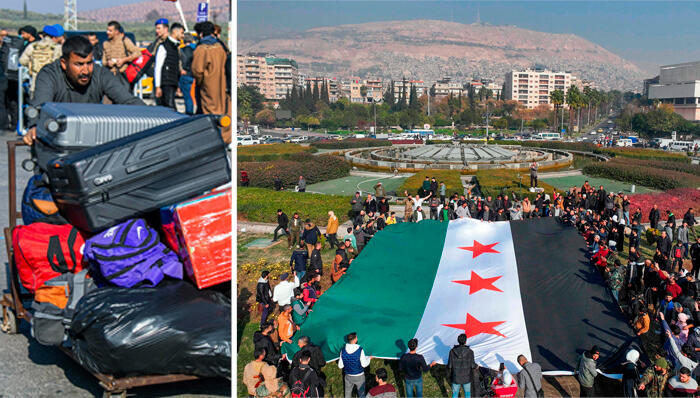
Analysis
Syria’s reconstruction sparks economic optimism in Turkey and Jordan
Refugee repatriation, trade, and construction projects promise new growth opportunities for neighboring nations.
The overthrow of the Assad regime in Syria has created a potential opportunity to rebuild the country after 13 years of devastating conflict that left its economic infrastructure in ruins. Syria's reconstruction can only proceed if stability is achieved. While it is uncertain whether Syria will experience sustained peace, a period of calm could pave the way for reconstruction efforts that may transform not only the political landscape but also the economic realities of the region, offering much-needed prosperity to its neighbors.
Rebuilding Syria will require a collaborative effort by international stakeholders with both capital and vested interests, particularly the European Union, which aims to repatriate millions of Syrian refugees who sought asylum within its borders. Additionally, Gulf states, keen to diversify their economies and stabilize the region, are expected to play a significant role in the process. The reconstruction costs are estimated at hundreds of billions of dollars, making it a long-term endeavor projected to last at least a decade.
1 View gallery


Victory celebrations in Damascus (right) and Syrian refugees crossing the border from Turkey
(Photos: Omar Haj Kadour / AFP AP Photo/Metin Yoksu)
One of the countries poised to benefit economically from a "new Syria" is Turkey, which supported the rebels in their campaign against Assad. Turkey currently hosts approximately 3.5 million Syrian refugees, making it the leading host country for displaced Syrians since 2011. The refugee influx has placed considerable strain on Turkey's resources, increased living costs (particularly in housing), and strained the job market. Turkish authorities report spending nearly $40 billion on refugee-related costs between 2011 and 2018, funds that could otherwise have been directed toward development projects.
The potential return of Syrian refugees to their homeland is seen as an economic relief for Turkey. However, some argue that Syrian refugees have contributed positively to Turkey's economy by boosting demand in sectors like manufacturing.
Beyond the refugee issue, Turkey stands to gain significantly in the construction and contracting sectors. Turkish companies, renowned for their expertise in international infrastructure projects, are well-positioned to play a leading role in rebuilding Syria's roads, bridges, public buildings, and utility networks. Evidence of optimism in Turkey's construction sector surfaced with a notable rise in the stock prices of construction firms (4%-10%) on the Istanbul Stock Exchange following the regime's collapse.
Turkey's geographical proximity and established industries, including cement and steel production, further bolster its prospects as a key supplier for Syria’s reconstruction. Turkey's experience as a major supplier of reconstruction materials to Iraq underscores its capacity to meet Syria’s substantial demand in this area.
Before the civil war, Turkey’s exports to Syria reached $1.3 billion in 2010, representing 1.6% of its total exports. Reviving and exceeding pre-war trade levels could stabilize and expand Turkey's manufacturing sector, benefiting thousands of small and medium-sized enterprises. As political stability improves, Turkey is expected to find export opportunities in food, textiles, pharmaceuticals, and basic consumer goods.
Reconstruction efforts in Syria will also necessitate the redevelopment of transportation infrastructure, an area where Turkish companies excel. From modernizing airports to managing supply chains, Turkish firms like Turkish Airlines and Pegasus have the potential to lead the logistics revival. Turkey's road and rail networks provide efficient routes for trade with Syria, further solidifying its strategic advantage.
Jordan, Syria's southern neighbor, also stands to gain from the reconstruction process. The influx of 660,000 Syrian refugees has significantly strained Jordan’s limited resources. Additionally, strained relations with Syria during the civil war curtailed trade and economic collaboration between the two nations.
The reopening of the Jaber-Nassib border crossing, once a vital trade artery, could reinvigorate the local economies of northern Jordan and revive transit trade with the Gulf states. In 2010, Jordan imported $160 million in goods from Syria and exported $100 million, while serving as a key transit hub for goods moving between Syria, Turkey, and Gulf markets. Reconstruction could restore these trade flows, boosting Jordan’s economy.
Jordan could also benefit from regional energy projects involving Syria and Lebanon. Plans to supply electricity from Jordan to Lebanon and natural gas from Egypt via Jordan and Syria—though previously stalled by U.S. sanctions and logistical challenges—may be revived under a new political order. These projects promise significant revenue streams for Jordan and the broader region.
The fall of the Assad regime and the potential stabilization of Syria create a rare opportunity for regional economic growth. For countries like Turkey and Jordan, reconstruction could alleviate domestic economic pressures while fostering long-term trade and development. The outcome will depend on the region's ability to seize this moment and ensure that reconstruction efforts are inclusive, strategic, and sustained.













